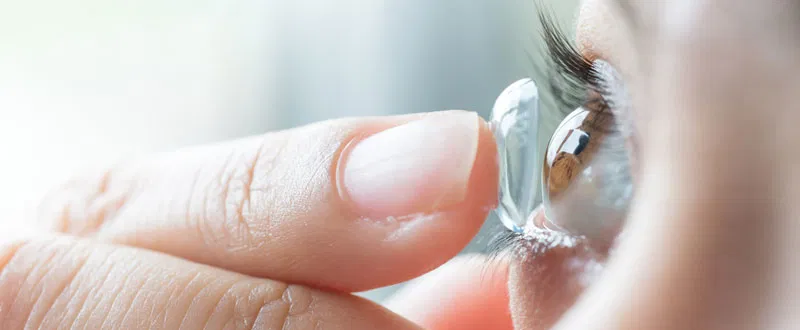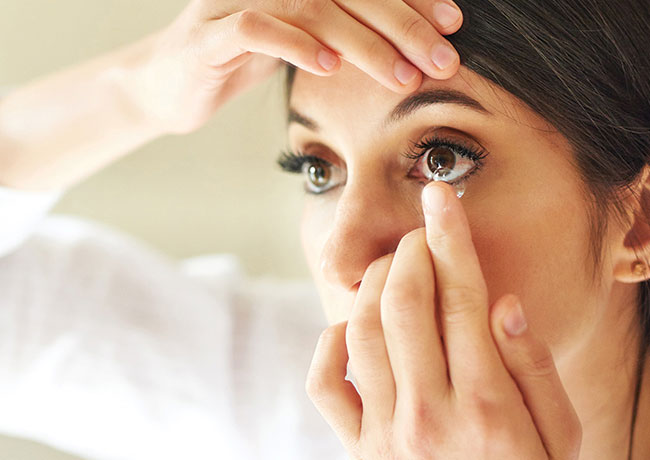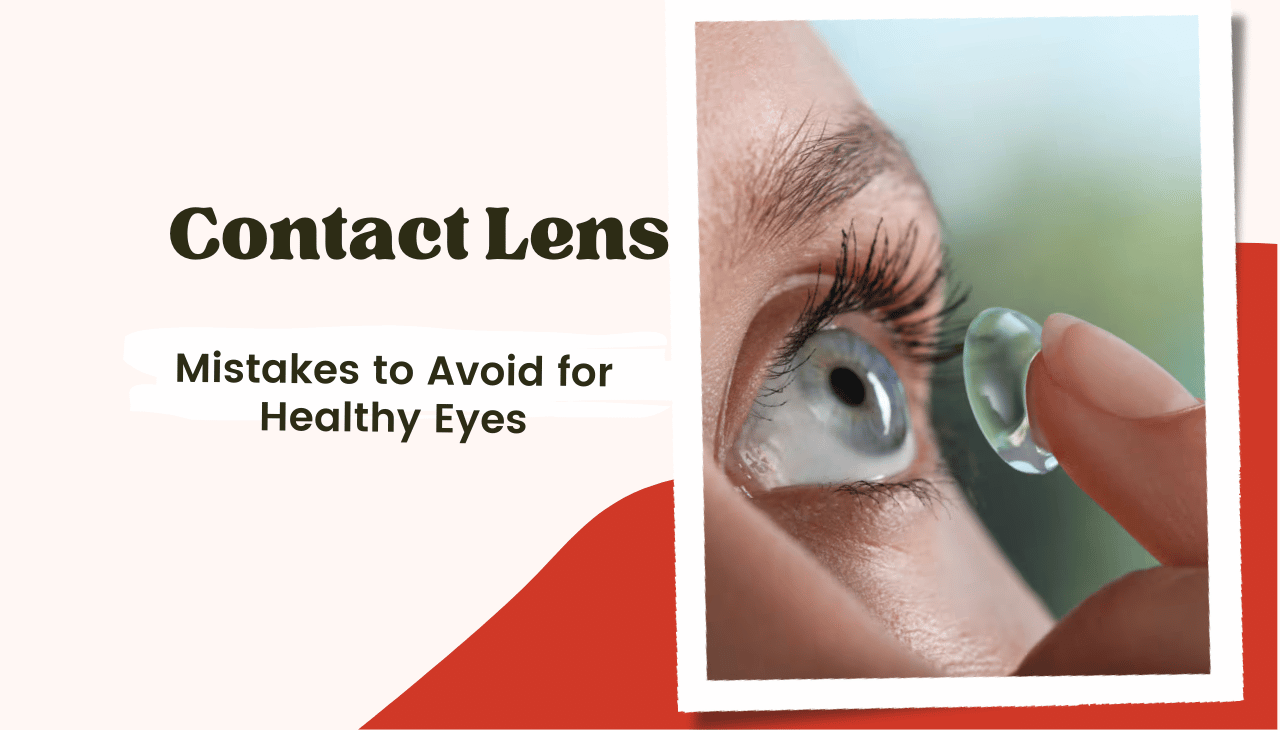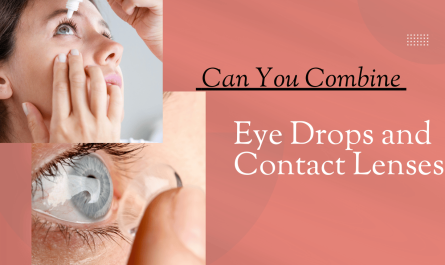Introduction
Contact lenses are a popular alternative to eyeglasses. They offer convenience, comfort, and a wider field of vision. But wearing them the wrong way can lead to serious eye problems.
If you’re one of the millions using contact lenses daily, it’s essential to understand the common mistakes people make. This blog will cover the top 7 contact lens errors, explain why they matter, and show you how to protect your eyes from harm.
By correcting these habits, you can avoid infections, reduce irritation, and enjoy clearer, healthier vision.
Understanding Contact Lenses and Eye Health

Contact lenses are thin, curved lenses placed directly on the surface of the eyes to correct vision. They’re typically used for nearsightedness, farsightedness, astigmatism, or presbyopia.
There are two main types of contact lenses:
- Soft Lenses – made of flexible plastics that allow oxygen to pass through.
- Rigid Gas Permeable Lenses – more durable and provide sharper vision in some cases.
Wearing contact lenses involves more than just placing them on your eyes. It requires proper hygiene, usage, and care. Poor habits can lead to eye infections, dryness, corneal damage, or even vision loss.
7 Common Contact Lens Mistakes
1. Sleeping with Your Lenses On
Many people fall asleep wearing their contacts, especially after a long day. But unless your lenses are specifically designed for overnight use, this can reduce oxygen supply to your cornea. It increases the risk of infections like keratitis.
Tip: Always remove your lenses before sleeping unless prescribed for extended wear.
2. Not Washing Hands Before Inserting or Removing Lenses
Touching your eyes with unwashed hands is an easy way to introduce bacteria and dirt into your eye. This can lead to redness, itching, and infections.
Tip: Wash your hands with soap and water, and dry them with a lint-free towel before handling your lenses.
3. Overwearing Your Lenses
Some users wear their lenses longer than recommended, hoping to stretch their use. This weakens the lens structure and puts your eyes at risk of oxygen deprivation, discomfort, and complications.
Tip: Stick to the schedule prescribed—whether daily, bi-weekly, or monthly replacements.
4. Using Tap Water or Saliva to Clean Lenses
Tap water and saliva contain microorganisms that are harmful to your eyes. Using them for cleaning can lead to severe infections.
Tip: Always use a sterile lens solution for cleaning, storing, and rinsing your lenses.
5. Skipping the Lens Case Hygiene
A dirty lens case can harbor bacteria that transfer to your lenses and then to your eyes. Neglecting the case can cause recurring infections.
Tip: Clean your lens case daily with contact lens solution (not water) and let it air-dry. Replace the case every 1 to 3 months.
6. Ignoring Expiry Dates
Expired lenses or solutions may no longer be sterile and could introduce contaminants. Using them can cause irritation and increase infection risks.
Tip: Always check expiry dates and avoid using products beyond them—even if they “look fine.”
7. Wearing Lenses While Swimming or Showering
Water from pools, showers, or hot tubs can introduce bacteria like Acanthamoeba, which can cause serious eye infections that are difficult to treat.
Tip: Remove lenses before swimming or wear waterproof goggles. Avoid wearing them in the shower.
Symptoms to Watch Out For

Even with careful use, contact lenses can sometimes irritate the eyes. Pay attention to early warning signs:
- Redness or swelling
- Itching or burning sensation
- Excessive tearing or discharge
- Blurred or hazy vision
- Feeling like something is in your eye
If you notice any of these symptoms, stop wearing your lenses and consult an eye specialist.
Safe Practices and Expert Recommendations
To keep your eyes healthy and contact-lens use safe:
- Follow your optometrist’s instructions on wear time and cleaning.
- Never share lenses with anyone.
- Use fresh solution daily—never “top off” old solution.
- Always carry your lens case and glasses as a backup.
- Schedule regular eye check-ups, even if you feel fine.
Your eyes are sensitive, and even minor negligence can lead to lasting damage.
Consultation Introduction
Laxmi Eye Hospital is one of the most trusted names in eye care in Mumbai. With over 30 years of excellence, the institute is known for its experienced ophthalmologists and transparent treatment approach. Whether it’s routine eye check-ups or advanced procedures, Laxmi Eye Hospital provides world-class diagnostics and treatment in Panvel, Kharghar, Kamothe, and Dombivli.
Patients receive expert care in various specializations, including:
- Specs Removal / LASIK (Bladeless LASIK, ICL and IPCL, Contoura Vision LASIK)
- Cataract Treatment
- Glaucoma Management
- Diabetic Eye Care
- Cornea Services (including Keratoconus and Eye Donation)
- Retina Treatments
- Pediatric Ophthalmology
Their cataract surgical training programs and specialty fellowships are among the most reputed in India.
Consultation & Clinic Locations:
Laxmi Eye Clinic (Dombivli)
1st Floor, SS Business Park, Gharda Circle, Azde Gaon, Tata Power Company Ltd, Dombivli East, Mumbai, MH 421201
Laxmi Eye Clinic (Kharghar)
Office 108-110, 1st Floor, Anant CHS Plot 31, Sector 04, Kharghar, Navi Mumbai, MH 410210
Laxmi Eye Hospital & Institute (Panvel)
Mulla Hamid Rd, Old Panvel, Navi Mumbai, MH 410206
Laxmi Eye Institute (Kamothe)
Shop 26/27, Near ICICI Bank, Pratik Gardens, Plot 153-165, Sector 34, Kamothe, Navi Mumbai, MH 410209
FAQs
1. Can I wear contact lenses every day?
Yes, but it depends on the type. Follow your doctor’s guidance on daily wear time and rest days.
2. What if I accidentally sleep with my lenses on?
Remove them as soon as you wake up and use lubricating drops. If discomfort or redness persists, consult your eye doctor.
3. How often should I replace my contact lens case?
Every 1 to 3 months to reduce the risk of contamination.
4. Is it okay to wear lenses while cooking or near smoke?
Avoid exposing your lenses to heat or smoke, which can cause them to dry out or warp.
5. What should I do if my lenses feel dry?
Use doctor-recommended lubricating drops and ensure you’re not overwearing them. Stay hydrated and avoid dry environments.
6. Are daily disposable lenses safer?
They reduce the risk of infection since there’s no need for cleaning or storage. They’re a good option for people with allergies or dry eyes.
7. Can contact lenses get lost behind my eye?
No, it’s anatomically impossible. They can get stuck under the eyelid but are easily retrievable.
8. Should I stop using lenses if my eyes are red?
Yes. Redness may indicate irritation or infection. Stop wearing them and seek medical advice.
Conclusion
Contact lenses are safe and effective when used properly. But even small mistakes can lead to serious eye problems. Being aware of these common errors and correcting them can protect your vision for years to come.
Make your eye health a priority. Regular check-ups with qualified professionals, like those at Laxmi Eye Hospital, ensure that your vision care is always in safe hands.


